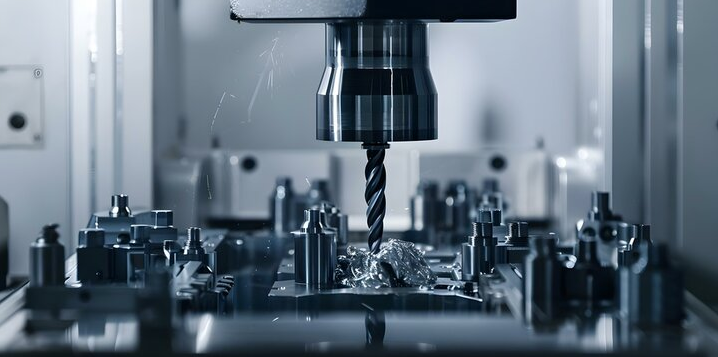
CNC milling machines are a vital part of modern manufacturing, offering precision, efficiency, and versatility in creating complex parts and components. This article will explore what CNC milling machines are, their benefits, applications, and key considerations for choosing and using them. By understanding these aspects, you can optimize your manufacturing processes and achieve superior results.
What is a CNC Milling Machine?
A CNC (Computer Numerical Control) milling machine is a type of machining tool that uses computer control to operate and manipulate cutting tools for shaping materials. The process involves feeding a piece of material, such as metal, plastic, or wood, into the machine, which then uses various cutting tools to remove material and create the desired shape. CNC milling machines can operate along multiple axes (typically 3 to 5) to create intricate and complex parts with high precision.
[elementor-template id=”4331″]
Benefits of CNC Milling Machines
- High Precision and Accuracy
- Tight Tolerances: CNC milling machines can achieve tight tolerances, making them ideal for applications requiring high precision.
- Consistent Quality: Automated control ensures consistent quality and repeatability across multiple parts.
- Versatility
- Wide Range of Materials: These machines can work with various materials, including metals, plastics, composites, and more.
- Complex Geometries: Capable of producing intricate shapes and complex geometries that would be difficult or impossible with manual machining.
- Increased Efficiency
- Reduced Setup Time: CNC milling machines can be programmed to perform multiple operations in a single setup, reducing setup time and increasing throughput.
- Automated Operations: Automation reduces the need for manual intervention, allowing for continuous and efficient production.
- Cost-Effective Production
- Reduced Labor Costs: Automation reduces the need for skilled labor, lowering overall production costs.
- Minimized Waste: Precision machining minimizes material waste, further reducing costs.
https://www.youtube.com/watch?v=3SUQKGu7F5w
Applications of CNC Milling Machines
- Aerospace Industry
- Precision Components: Manufacturing of precision components such as turbine blades, aircraft structural parts, and engine components.
- Complex Assemblies: Production of complex assemblies that require high precision and tight tolerances.
- Automotive Industry
- Engine Parts: Creation of engine components, transmission parts, and other automotive parts.
- Prototyping: Rapid prototyping of new designs and components.
- Medical Industry
- Surgical Instruments: Manufacturing of surgical instruments, implants, and prosthetics with high precision.
- Dental Applications: Production of dental crowns, bridges, and other dental appliances.
- Consumer Goods
- Custom Products: Creation of custom and high-end consumer products such as jewelry, watches, and electronics.
- Home Appliances: Production of components for home appliances and other consumer electronics.
Key Considerations for Choosing a CNC Milling Machine
- Machine Size and Capabilities
- Work Envelope: Ensure the machine’s work envelope is suitable for the size of the parts you intend to produce.
- Axis Configuration: Choose between 3-axis, 4-axis, or 5-axis machines based on the complexity of the parts.
- Spindle Speed and Power
- Material Compatibility: Ensure the spindle speed and power are suitable for the materials you will be machining.
- Surface Finish: Higher spindle speeds can achieve better surface finishes on certain materials.
- Control System
- User Interface: A user-friendly interface can simplify programming and operation.
- Software Compatibility: Ensure compatibility with your preferred CAD/CAM software.
- Tooling and Accessories
- Tool Holders: Choose appropriate tool holders and cutting tools for your specific applications.
- Additional Features: Consider features such as automatic tool changers, coolant systems, and probing systems.
- Cost and Budget
- Initial Investment: Consider the initial cost of the machine and any additional accessories or tooling.
- Operating Costs: Factor in maintenance, tooling, and operational costs.
Conclusion
CNC milling machines are essential tools in modern manufacturing, offering high precision, versatility, and efficiency. By understanding the benefits and applications of these machines, as well as key considerations for selecting and using them, manufacturers can optimize their processes and achieve superior results. Whether in aerospace, automotive, medical, or consumer goods industries, CNC milling machines provide the capabilities needed to produce high-quality parts and components.
Related Conten: Injection Molding Factory
 DTG Mould Trade Process |
|
| Quote: | According to sample, drawing and specific requirement. |
|---|---|
| Discussion | Mold material, cavity number, price, runner, payment, etc. |
| S/C Signature | Approval for all the items. |
| Advance | Pay 50% by T/T |
| Product Design Checking | We check the product design. If some position is not perfect, or can not be done on the mould, we will send customer the report. |
| Mold Processing | Send report to customer once each week |
| Mold Testing | Send trial samples and try-out report to customer for confirmation |
| Mold Modification | According to customer’s feedback. |
| Balance Settlement | 50% by T/T after the customer approved the trial sample and mould quality. |
| Delivery | Delivery by sea or air. The forwarder can be designated by your side. |
 |
|
